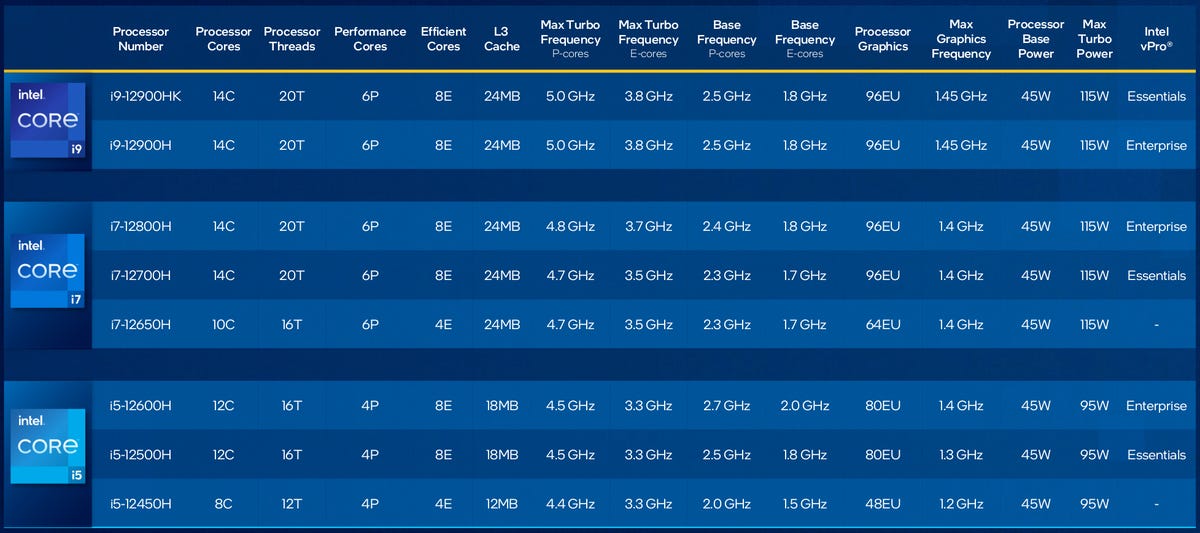CES 2022: Intel says its top mobile Alder Lake Core i9 will beat the Apple M1 Max | ZDNet
Image: Intel
Intel has taken the wraps off its mobile H-series Alder Lake processors at CES 2022, which the chip giant claimed is able to outperform the vaunted Apple M1 Max.
In a chart bearing percentages and without helpful grid lines, Intel has claimed its Core i9-12900HK is able to top Apple’s silicon at power loads above 35 watts, although it also shows the M1 Max is able to operate at much lower wattages, down to around 20 watts, while the i9 peters out around the 30 watt mark.
For completeness, Intel also said an AMD Ryzen 9 5900HX can top the M1 Max at 25 watts, but otherwise has fairly flat performance and is eventually topped by both Apple and Intel 11th and 12th generation silicon.
The company said it was basing its measurement on SPECrate using the best compilers, which means Intel’s ICC for the PC chips and Xcode for Apple, and best memory available.
Under the H-series release of its Alder Lake processors, all of which have base power of 45 watts, Intel has released a pair of i9 chips, and a trio each of i7 and i5 processors.
The i9-12900HK and i9-12900H have 14 cores made up of six performance and eight efficient cores, can run 20 processor threads, have 24MB of L3 cache, a max frequency of 5GHz, take 115 watts for maximum power, and only differentiate by having vPro Enterprise, the new name for what traditionally has been vPro and now supports Chrome OS, for the latter, while the former gets a vPro subset for SMBs that includes basic cloud-based device management called vPro Essentials. The i9-12900HK is also unlocked for overclocking.
The i7-12800H and i7-12700H have the same specs as the i9s except for having a lower peak frequency of 4.8GHz and 4.7GHz, respectively, with vPro Essentials for the 12700H and vPro Enterprise for the 12800H. The i7-12650H has no vPro, 10 cores capable of 16 processor threads on six performance and four efficient cores, and 24MB of L3 cache.
For the three i5 chips that take 95 watts as maximum turbo power, the i5-12600H and i5-12500H have 12 cores capable of 16 processor threads on four performance and eight efficient cores, and 18MB of L3 cache with a peak frequency of 4.5GHz. The i5-12600H has vPro Enterprise and i5-12500H has vPro Essentials.
Rounding out the lineup, the i5-12450H is an 8-core chip that runs 12 processor threads on four performance and four efficient cores, has 12MB of L3 cache and peak frequency of 4.4GHz, and is without vPro.
The H-series chips have support for DDR5-4800, DDR4-3200, LPDDR5-5200, and LPDDR4x-4267 memory, and will be available in laptops in February.
Alongside the new chips, Intel is expanding its Evo platform to a third edition, with the latest specification being so-called intelligent collaboration, which boils down to being able to video conference for longer.
In technical terms, Intel is specifying 12th generation silicon, Wi-Fi 6E, AI-based noise reduction using the Gaussian and neural accelerator, and generally a greater than full HD camera. On Windows, it also means using Intel Connectivity Performance Suite for traffic prioritisation.
The company said it would now extend the program to laptops with 15 and 16-inch displays that use its Intel Arc discrete graphics and H-series Alder Lake chips, as well as expand its “Engineered for Intel Evo” certification to Bluetooth accessories. It also added that it expected the Horseshoe Bend foldable OLED devices first mentioned two years ago to hit the market this year.
Beyond the H-series, Intel said it had 12th generation 28-watt P-series chips and nine to 15 watt U-series chips for thin laptops, landing this quarter. The six P-series chips range from a six performance and eight efficient core i7-1280P, down to a two performance and eight efficient i3-1220P. The U-series tops out with a two performance and eight efficient core i7-1265U, and ends with a one performance and four efficient core Celeron 7305.
On the desktop front, Intel expanded its Alder Lake offerings with 22 new chips ranging from i9 down to Pentium Gold and Celeron chips. The company has nine chips with base power of 35 watts, with the processor designation ending with a T, while the remainder have base power at 65 watts, and have no letter suffix, unless it is an F that means no integrated Intel UHD 770 graphics.
Only the desktop i9 and i7 have the hybrid architecture with the different types of cores, with all chips i5 and lower only having performance cores.
The company is also bringing Project Athena to the vPro desktops, with touted features being automated locking when the user walks away, automated unlocking when the user approaches the desktop, as well as AI noise reduction, more sustainable form factors, and “simplified” cable connections.

Image: Intel
For all the latest Technology News Click Here
For the latest news and updates, follow us on Google News.
